Foundation Plugin
-
Are you looking to add several other layers such insulation and surface finishes ie. screed in the future?
-
Moisture barrier?
-
Being that it is the weekend of the 4th I was quite surprised at all of the feedback on my previous post, thank-you for taking the time to respond and provide valuable feedback and information.
It seems that slab insulation is also a feature that I should also add to the mix. Most details I've seen shown it directly below the slab between the subbase and concrete:
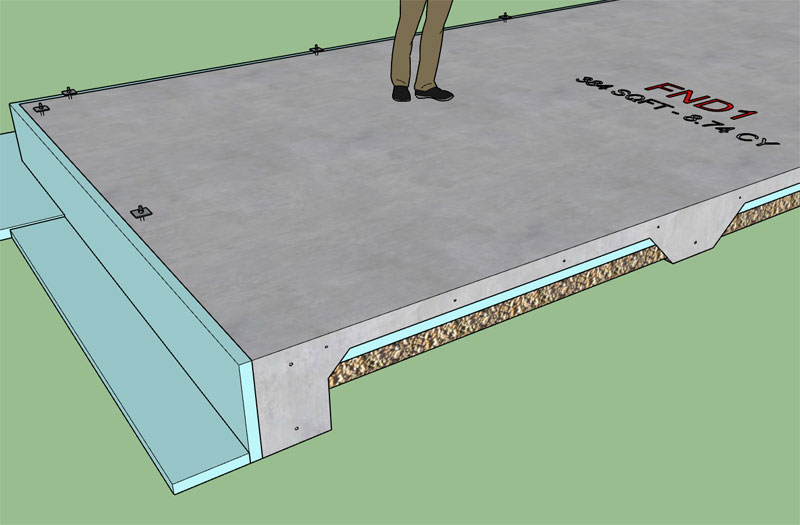
Note that many details I've seen show the slab insulation wrapping down around the footing or at least dropping down along its vertical side to the bottom of the footing. However, to model the slab insulation in this way would be very computationally expensive (in other words a big pain in the butt) and require some rather elaborate code.
What I've shown is a slightly simplified version which I can easily achieve using some very simple boolean addition and subtraction.
The updated list of parameters is now:
Slab Insulation: Yes/No
Slab Insul. Thickness: Default to 2"Subbase: Yes/No
Subbase Thickness: Default to 4" or 6"
Subbase Material: Default "medeek_gravel", user can choose from custom material libraryI've also had quite a few request for poly. I've never been a big fan of modeling non-solid geometry (ie. 2D films, vapor barriers etc...) In my opinion the SQFT callout for the foundation is enough information for the designer to know how much poly is needed for the foundation if they want to apply it below the slab (plus some waste factor). I'll have to give this some more thought.
-
First look at a rectangular slab-on-grade with slab insulation and subbase material installed.
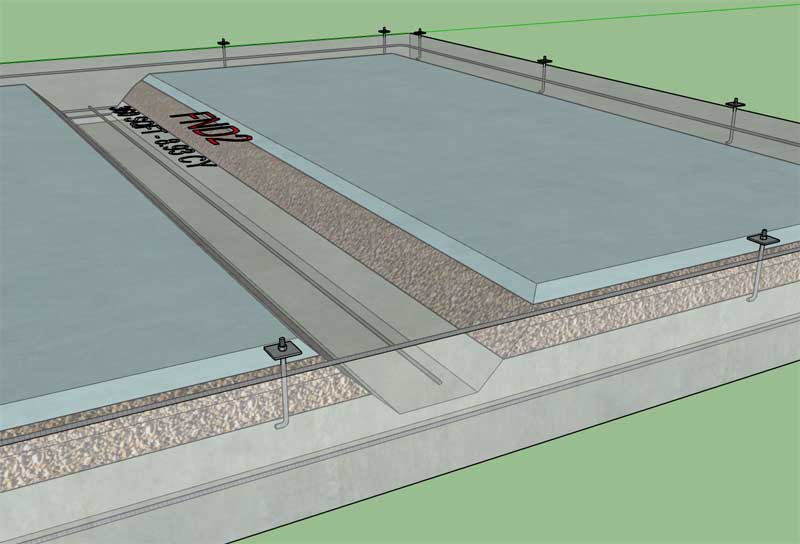
Now I just need to jump into the polgyon module and enable the same feature for a polygon/face outlined slab-on-grade and then we can roll this new feature out.
When I get a bit more time I will also add in the volume of the subbase material (CY) into the stats tab (attribute library) which can then be picked up by the estimator module and this information will also be part of the spreadsheet (Excel/CSV) output.
Note to other developers:
As I further develop these plugins I am including a stats table in the attribute library of each assembly I create. This information is exposed and can be utilized by anyone, including other plugins. For instance for slab-on-grade foundations I provide the number of anchor bolts, the lineal feet of rebar, the area of the slab, and the volume of the concrete. If there are any questions about any of the entries in this table and what each number means I will be more than happy to dive into the details with you.
-
Version 1.2.8 - 07.07.2019
- Added slab insulation and subbase options for rectangular slab-on-grade foundations
- Added slab insulation and subbase options for polygon slab-on-grade foundations
- Added a subbase layer in the Global Settings under the "Layers" tab.
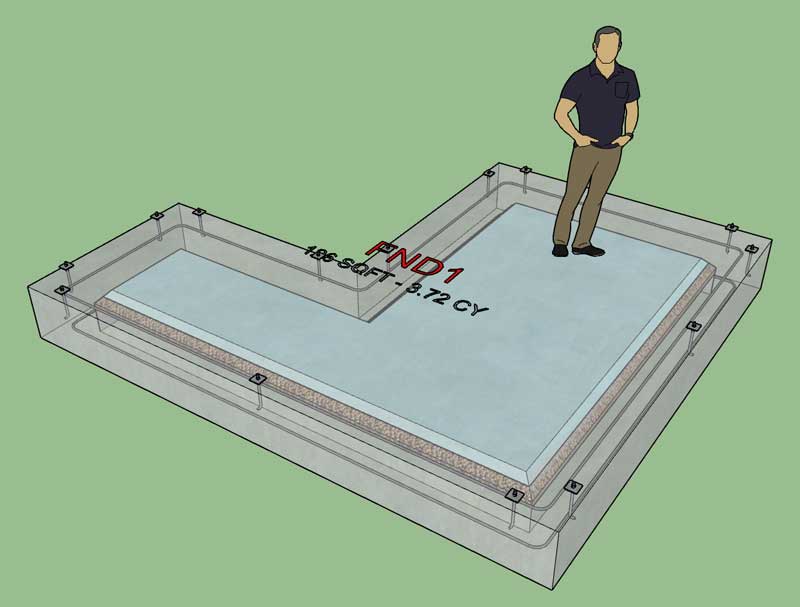
Please note that the new interior footings module and the brick ledges module are both under construction. The current toolbars and icons for these modules are currently non-functional.
Both modules are actually quite complicated so my best calculation is about a week's worth of programming for each in order to complete them.
The FPSF option must be toggled on to enable under slab insulation. However, you now have the option to enable or disable perimeter insulation within the FPSF options.
-
Version 1.2.9 - 07.08.2019
- Added a Custom Material Library/Manager in the Materials tab of the Global Settings.
- Enabled custom materials for the subbase material in the HTML edit menus for slab-on-grade foundations.
I've had some conversations about providing formwork for the various foundations. This is not a high priority right now but at some point I may decide to add in this advanced option.
-
First look at a slab-on-grade (rectangular) foundation with multiple interior footings:
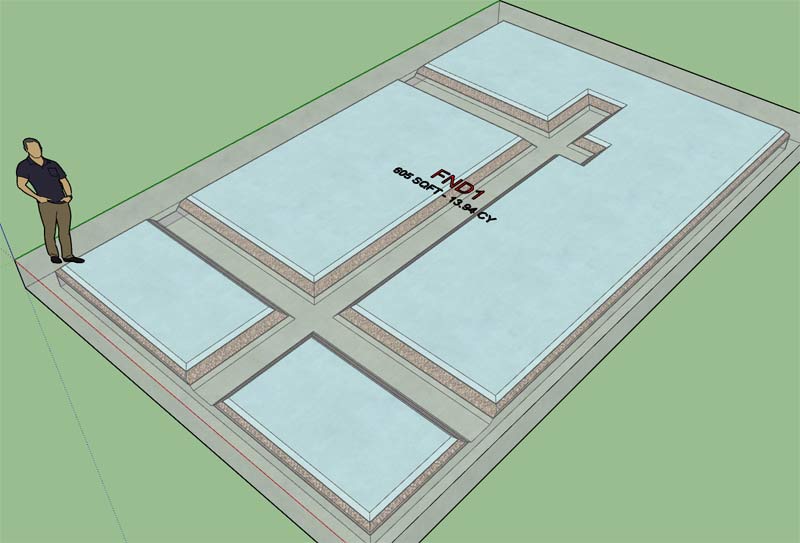
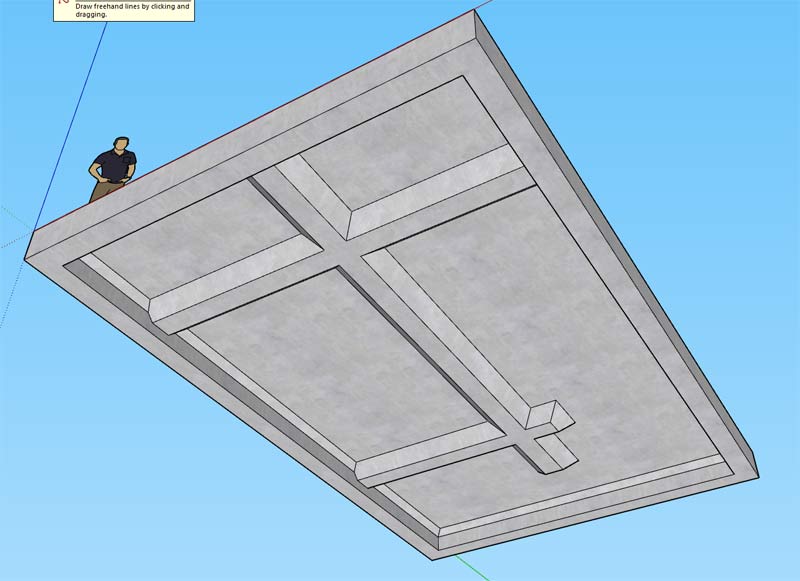
Note that this feature (interior footing module) allows for an unlimited amount of interior footings in any orientation and with each footing being customizable to its own specifications.
As shown in the image above this new feature also works with the subbase and slab insulation options.
Now I just need to work on the edit, move and delete functions for the interior footings.
-
This image demonstrates the vertical drop option/parameter along with various rebar configurations:
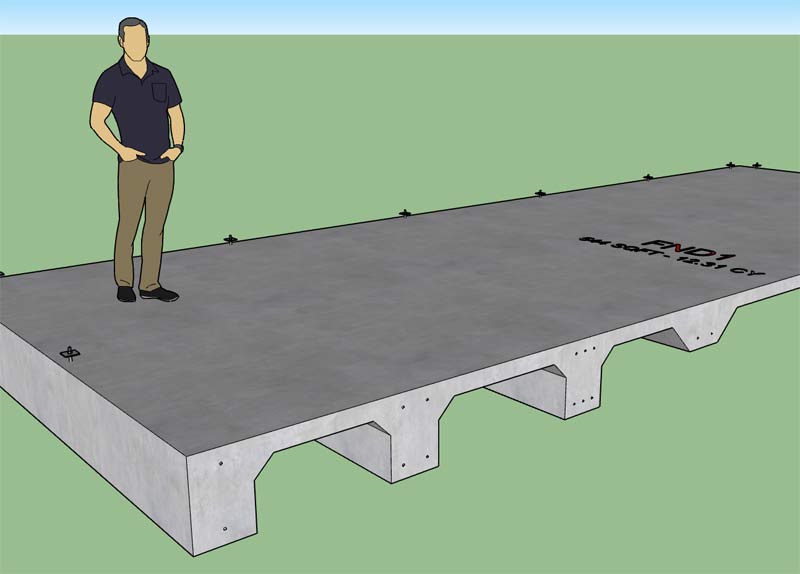
The footing to the far right is a typical 12" deep shallow footing with two bars.
The two central footings are 18" deep (4" slab) with a 10" vertical drop. When you specify a qty. of four or six bars the plugin will arrange the bars top and bottom as shown otherwise the bars will be positioned at the bottom of the footing (with a 3" ground clearance).
Note that all of the footings shown have a slope of 45 deg. however this can also be customized to any angle.
-
Working in 3D is a bit different, and poses some additional challenges, when compared with designing in a 2D environment.
Slab-on-Grade interior footings are an excellent example of this type of problem. In a 3D environment you are usually wanting to work on your model looking down at it rather than looking up at it. Unless you have modified the transparency of concrete material you are typically unable to view the interior footings you have created.
To remedy this problem I have created a hidden layer (normally hidden) that is toggled on when you go to add, edit, delete or move an interior footing. This layer not only contains the outline of each footing but also the label assigned to each by the plugin:
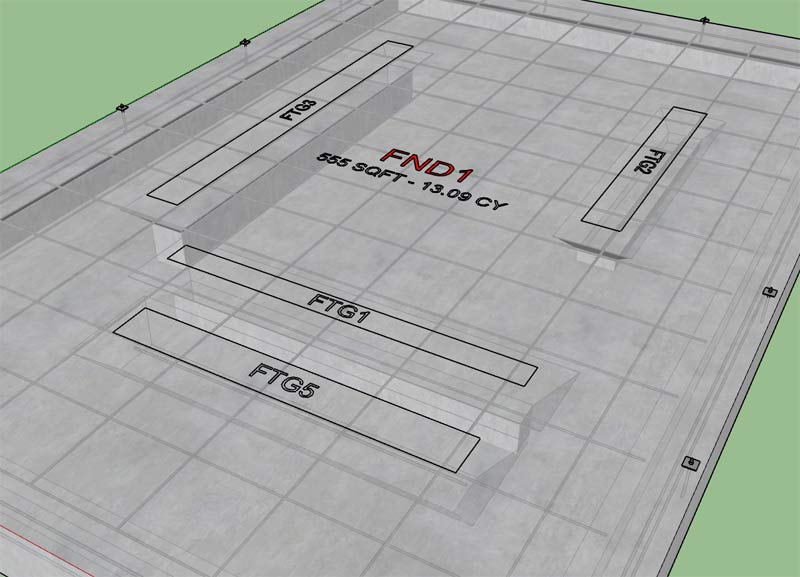
This layer can always be toggled manually by the user, but I have also setup the various tools to toggle it on and off during appropriate actions.
-
As I've been putting the new interior footing module through its paces it occurred to me that the waffle type floor systems seen in large parking structures and in Australian residential construction will now be possible with this new feature.
I'm pretty excited to finally see this feature become a reality. I should have made this happen a couple years ago, but in all truthfulness I probably did not possess the programming chops or experience to make it happen at the time.
Fast forward a couple years, and I have much better handle of what I can and can't do with SketchUp's API. I've also been able to lean on and gain advice from some of the SketchUp sages along the way. Thank-you for coming to my rescue, and being so generous with your advice and time, it has made all the difference.
-
Version 1.3.0 - 07.14.2019
- Added interior footings for rectangular slab-on-grade foundations.
- Added interior footings for polygon slab-on-grade foundations.
- Enabled editing, moving and deleting of interior footings for all slab-on-grade foundations.
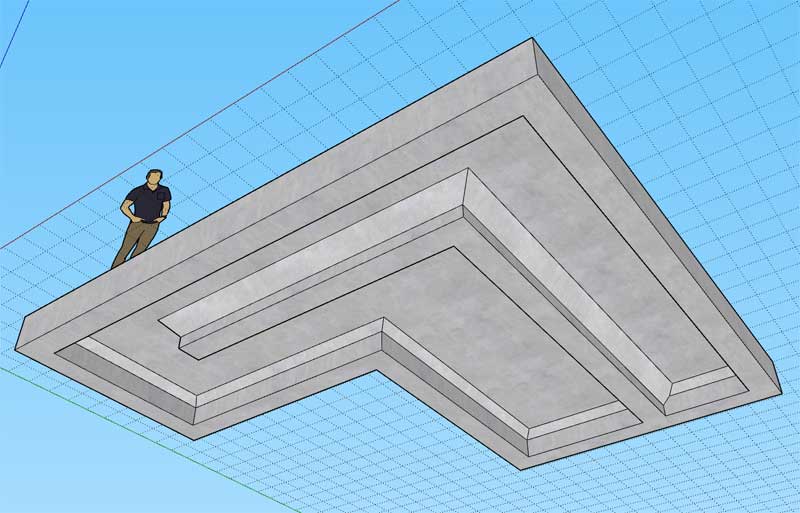
This is a substantial upgrade for slab-on-grade foundations. I've completely removed the old interior footing code and replaced it with the new interior footing module. The ability to add, move, edit and delete each interior footing on an unlimited basis is a breath of fresh air for this plugin.
Now I just need to do something similar for stemwall foundations and slabs... there is always more to do.
Later today, after a small break, I will put out a tutorial video explaining the features of this new module and demonstrate its use.
-
your download page for this indicates version 1.2.3 released 07/14/2019.
-
@juju said:
your download page for this indicates version 1.2.3 released 07/14/2019.
Which page are you referring to? Can you give me the URL. The plugin page on my website is showing version 1.3.0.
-
I've been considering the addition of a tool that adds in a depression to the slab-on-grade. The user would create any polygon shape which would then be used to generate this depressed region on the slab.
The actual modifications to the concrete slab would be fairly easy to accomplish with the API however a number of ripple effects would pose other problems. The first problem would be slab reinforcement. The depressed region would need to have its reinforcement translated down with the slab so it remains centered within the slab.
A similar problem exists for slab insulation and subbase material, these items would need to be moved down in the z direction as well. This of course is assuming that the slab in the depressed region remains the same thickness as the rest of the slab, however this might not be the case.
One could assign the a zero thickness to the depressed region slab thickness which essentially cuts a hole in the slab if the depression is equal to the slab thickness.
Or one could specify a thicker slab in this depressed region.
Regardless slab depressions are quite interesting and introduce a number of complex problems when combined with other features like internal footings, slab insulation, subbase and slab reinforcement.
-
After mauling this over a bit more I think I can deal with the concrete, slab insulation, interior footings and subbase fairly easily with a slab depression, however the slab reinforcement is a bit more challenging. Even the footing top bars are a bit problematic ( they need to be dropped as well) as one can see in the image below:
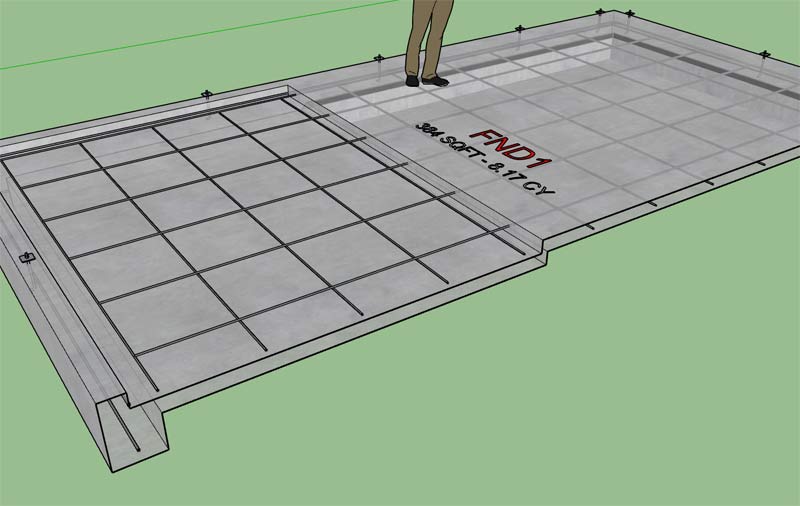
At the moment I don't have a good answer for how to deal with slab depressions when combined with slab reinforcement. If anyone has a good idea I'm open to suggestion.
This type of slab depression (4") is fairly typical for a garage that is attached to the main residence.
View model here:
3D Warehouse
3D Warehouse is a website of searchable, pre-made 3D models that works seamlessly with SketchUp.
(3dwarehouse.sketchup.com)
I'm not saying there are not solutions to this problem but they become very computationally expensive (ie. boolean subtraction) and are not at all optimal.
-
-
A website typo, please check it now...
Thank-you for promptly bringing this to my attention.
-
Tutorial 3 - Interior Footings for Slab-on-Grade Foundations (16:33 min.)
Interior footings for rectangular slab-on-grade foundations is identical to working with polygon shaped foundations.
-
First look at the slab depression toolbar:

This toolbar will allow the user to add, delete, edit or modify slab depressions within slab-on-grade or slab foundations.
-
BUG REPORT: I'm missing a transform in the "Add Interior Footing" tool, so if a foundation is created in a location other than the origin, it may produce an unexpected result (ie. shifted footing location). I am working on the fix currently. Funny that I never exposed this error in my testing or even in the tutorial video, it does take a special set of circumstances.
I've also identified another issue where two footings might be coincident at their ends (start or end) at a non-orthogonal angle, see image below:
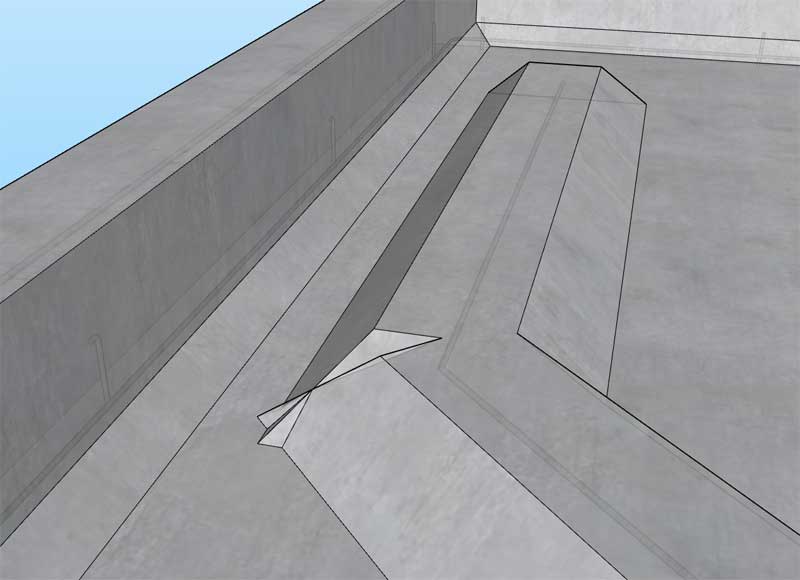
In such a situation rather than sloping the ends of the footing towards each other I need to miter the ends so that they meet cleanly. Just some additional code in the block of code that applies the slope to the footings.
If three footings or more footings were to meet at a single point then the boolean union of them would work out without a hitch, it is only when you join two footings at their ends that this scenario becomes an issue.
Advertisement










